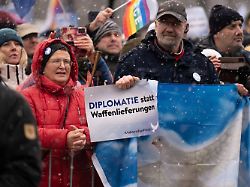The majority of the participants in the rally by Alice Schwarzer and Sahra Wagenknecht probably have real fears and legitimate positions. However, two questions remain unanswered.
Two questions arise from the point of view of a person who does not blindly believe what Sahra Wagenknecht and Alice Schwarzer announced on Saturday from the stage behind the Brandenburg Gate.
First of all, what will happen to Ukraine if the West stops supplying arms? There are several possible answers: It could be that Schwarzer and Wagenknecht don’t care about Ukraine. That sounded very clear in their speeches, because at their rally the country attacked by Russia was hardly ever spoken of as an active subject, but primarily as a victim – of the USA. The culprit, Russia, was not mentioned at key points.
Schwarzer said there were “dead people, raped women, traumatized children, a serious shock to Europe, an economic crisis, not to mention the situation in the Global South”. She didn’t say who was responsible for the deaths and the rapes. A conscious omission? Hiding an uncomfortable truth?
Nobody is really responsible
Schwarzer spoke of the war as “the pinnacle of masculinity,” as if it were a natural disaster for which no one is really responsible. There may be wars that start like this. This war, however, has a clear originator: Putin ordered the invasion of Ukraine. He lets his soldiers kill, rape and abduct children there.
Wagenknecht, on the other hand, portrayed Ukraine as a country not worth supporting: “Ukrainian oligarch capitalism, which is just as corrupt as Russia’s, is allegedly fighting for our freedom and our democracy,” she said. She turned the victim into a perpetrator, because her speech naturally included a reference to the Russian legend that Ukraine is fascist.
A greeting enthusiastically announced by Wagenknecht via video even spread the conspiracy theory that there had been a “coup d’etat” in Ukraine directed by the United States. Wagenknecht described the greeting as a competent ex-advisor to all possible international organizations. She hid that this man also appears in propaganda shows on Russian television.
Wagenknecht believes in a Putin who doesn’t exist
Maybe it’s all just a misunderstanding and the alleged empathy of Wagenknecht and Schwarzer for Ukraine is not feigned, but real. Then the question would remain how Ukraine should defend itself without help. Wagenknecht and Schwarzer said nothing about it. Dying must come to an end, was all Schwarzer said. Who would disagree with her?
But would the dying stop if the arms shipments stopped? An answer that was occasionally heard among participants in the demo was: Then there will be negotiations. You can believe that. More likely, Putin would completely “denazify” and “demilitarize” Ukraine – subdue or annihilate it.
Despite the bloody reality in Ukraine, there is no Putin in Wagenknecht’s imagination who would do such a thing. Her quote from a year ago has been recalled several times these days, including here. She said at the time: “We can be very glad that Putin is not as he is portrayed. Namely, a crazy Russian nationalist who gets drunk on pushing borders.” The quote went even further: if that were the case, said Wagenknecht, then diplomacy would be hopelessly lost. “And I don’t want to imagine how long Europe would still be habitable.” Rather, Putin is a cool, calculating power politician who has always behaved in a relatively predictable manner.
Cynical but legitimate
That turned out to be wrong. Putin is probably more correctly described as an imperialist who follows ethnic ideas and probably even believes in them himself. Would someone like that actually negotiate if Ukraine ran out of weapons? Hardly likely. The Wagenknecht from a year ago was right: Diplomacy has no chance at the moment – it’s Putin who doesn’t give it a chance. Ironically, she gave her speech at the Brandenburg Gate behind a sign that read “Diplomacy, not arms deliveries.”
The second question follows on from this demand: Does it really increase the security of Western Europe if we drop Ukraine? Schwarzer and Wagenknecht clearly say yes. “Now it’s about even more than the peaceful existence of Ukraine, now it’s about the existence of the world,” Schwarzer said in her speech. One can call this attitude cynical, but it is legitimate to put one’s own security interests above those of another country – even if one can then no longer speak of “solidarity” with Ukraine without making oneself look ridiculous.
One thing is clear: It is not possible to say with certainty what is wiser from a purely German and Western European point of view. “No one has a blueprint in their drawer for this war,” said SPD foreign policy expert Michael Roth in an interview with ntv.de. He himself advocates arms deliveries, but concedes: “Both approaches are associated with risks, including my strategy of defending ourselves and showing solidarity with Ukraine. We will probably only know in a few years what the right way would have been.” The catch is: we have to make decisions today.
